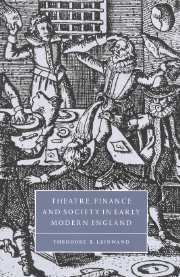Afterword
Published online by Cambridge University Press: 22 September 2009
Summary
It has recently been argued that affect largely governed two very important decisions made by the King's Men. In The Shakespearian Playing Companies, Andrew Gurr twice narrates and tries to make sense of the King's sharers' decision, first, to continue to use the Globe after the Burbage brothers had reacquired the Blackfriars lease in 1608 (they could have abandoned the Globe or they could have let out the Blackfriars playhouse – instead, each playhouse was left dark for one half of the year), and second, to rebuild the Globe, at very great expense, after it burned down in 1613. What the sharers were giving up after 1608, according to Gurr, “was the doubled rents they would have obtained if either playhouse had been let to another company” (118). Had they not rebuilt the Globe, “their income would have remained much the same from playing at the Blackfriars all the year round … In fact, by 1613 they must have known that the Blackfriars could bring in consistently higher returns than the Globe” (118). Gurr concludes that although the Burbages and their fellow sharers must have thought that they were making “sound investment[s]” (297), their decisions were “eccentric” (116) and in the “short term, financially … quixotic” (115). To explain such seemingly “uneconomical” choices (297), Gurr again and again recurs to nostalgia, to “substantial,” “quixotic,” and “costly” nostalgia (117 and 297). Theirs was “much more an investment in nostalgia than an investment for profit” (118).
- Type
- Chapter
- Information
- Theatre, Finance and Society in Early Modern England , pp. 140 - 143Publisher: Cambridge University PressPrint publication year: 1999



